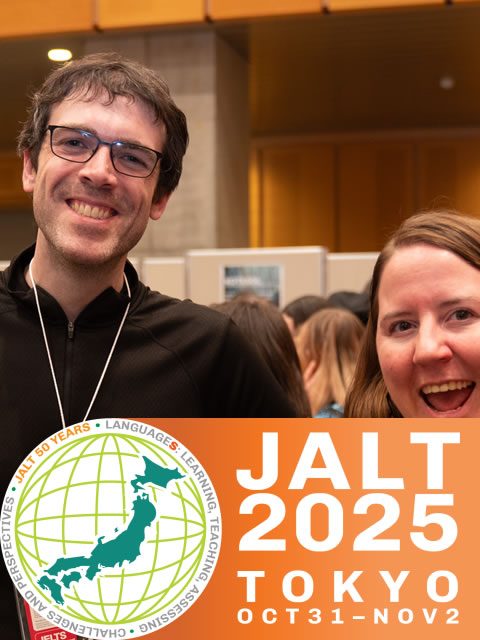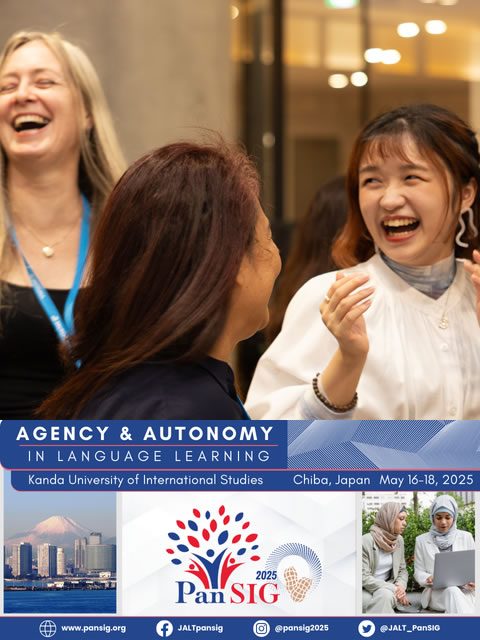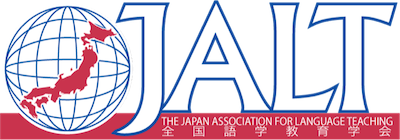Your cart is currently empty!
Featured Speakers
•
JALT2012 Plenary and Featured Speaker articles from the July/August edition of The Language Teacher (Vol. 36, No. 4) are available in PDF format. Use this link to download the PDF from the JALT Publications website.
Diane Hawley Nagatomo
Gender Counts: Women in Japanese Higher Education
Sponsor: Gender Awareness in Language Education SIG
Saturday, October 13, 11:00-12:30, Room 43
Teachers’ identities form through constant movement between their personal and professional lives, and they are shaped by the wider sociocultural context in which they live and work. In Japan, a distinct gendered division between the educational and professional opportunities available for women and men may be at the heart of how teachers see themselves and how others see them. This featured speaker workshop will be comprised of two parts. The first part will be a guided discussion covering gender issues that influence the lives of Japanese and non-Japanese female and male teachers. The second half of the workshop will explore ways of interpreting identity formation through a guided analysis of data obtained from Japanese female university teachers’ narratives. Upon completion of this workshop, participants should have a greater understanding of a useful analytical tool for exploring gender-related issues in personal and professional settings.
Diane Hawley Nagatomo has been living and teaching in Japan for more than 30 years. She is an associate professor at Ochanomizu University and has a PhD in Linguistics from Macquarie University. She has authored and coauthored numerous EFL textbooks for the Japanese market, and her book, Exploring Japanese University English Teachers’ Professional Identity, was published by Multilingual Matters in February 2012. Her featured speaker workshop at JALT is sponsored by the GALE SIG.
Charles Browne
Maximizing Vocabulary Development with Online Resources
Sponsor: English Central
Saturday, October 13, 11:00-12:30, Room SR62
Although there are now many online resources for accessing authentic video in and out of the classroom, this presentation argues that the gap between the average vocabulary size of typical EFL language learners and the amount of vocabulary needed to comprehend those videos is usually quite daunting. In this session, the presenter will begin by developing the argument for the importance of teaching high frequency vocabulary, citing some of his background research on the serious vocabulary gaps that face EFL learners in Asia. He will then describe the theoretical underpinnings of several online scaffolding tools he helped to develop for assisting students to be able to better comprehend unsimplified videos (as well as some excellent freeware and shareware equivalents). Participants will also be introduced to an approach for rating the difficulty of videos by their vocabulary content and simple techniques for developing targeted special purpose vocabulary lists based on corpus research of the transcripts of the video.
Charles Browne is Professor of Applied Linguistics and head of the EFL teacher-training program at Meiji Gakuin University. He is a specialist in Second Language Vocabulary Acquisition, CALL, and has written dozens of research articles and books, including a monthly column for Japan’s top English education journal (Eigo Kyoiku). He is deeply active in the area of CALL, helping to create research-based language learning software such as WordEngine, EnglishCentral and GoFluent, and works hard to share this knowledge with teachers and researchers through countless hand-on workshops and courses with Boards of Education around the country as well as Columbia Teachers College and Temple University Japan.
Garold Murray
Motivation and Identity: Imagining a Difference
Sponsor: College and University Educator SIG
Saturday, October 13, 3:50-5:20, Room 43
This workshop will explore how teachers can work with imagination, narrative and autonomy in order to foster learners’ motivation. The introduction will provide an overview of the key constructs and situate the topic in the literature by briefly discussing Norton’s imagined communities and Dörnyei’s L2 Motivational Self System. These theories suggest that teachers might enhance learners’ motivation by helping them to develop and sustain visions of future selves as foreign language speakers and possible participants in target language communities. The rest of the workshop will focus on ways to do this. Participants will have an opportunity to consider specific suggestions for classroom practice in relation to their own teaching context. They will also be invited to engage in activities which draw on narratives of their own teaching experience and rely on their imagination as they devise ways to support learners’ visions and make those visions a reality.
Garold Murray is associate professor in the Language Education Center at Okayama University. In addition to having taught EFL courses in undergraduate, graduate, and teacher education programs, he established two self-access centers in Japan—one of which is open to the general public. He has served as president of the Japan Association of Self-Access Learning (2005-2010) and convener of the AILA Research Network on Learner Autonomy in Language Learning (2005-2011). His research interests include narrative inquiry, learner autonomy, metacognition, imagination and the social semiotics of place. He is co-editor of the book Identity, Motivation, and Autonomy in Language Learning.
Carolyn Graham
Making it Memorable through Songs and Chants
Sponsor: Oxford University Press
Saturday, October 13, 3:50-5:20, Room SR62
In the words of Alan Maley, it is rhythm that “underlies the ability to speak English accurately and with confidence.” Jazz Chants are a rhythmic expression of spoken American English. They are a particularly effective way to teach natural intonation and pronunciation in a fun, engaging way.
Just as the selection of a particular tempo and beat in jazz may convey powerful and varied emotions, the rhythm stresses and intonation patterns of the spoken language are essential elements for the expression of the feelings and the intent of the speaker.
Although the primary purpose is the improvement of speaking and listening comprehension skills, they also work well in reinforcing specific structures in a situational context.
In this featured speaker workshop, participants will learn ways to bring Jazz Chants into their classrooms and to create their own chants to help make a difference in the lives of their students.
Carolyn Graham is synonymous with Jazz Chants® , a technique which she created that connects the rhythm of spoken American English to the beat of jazz. She developed the technique during her twenty-five years’ teaching ESL in the American Language Institute of New York University. She has also taught at Harvard University, the NYU School of Education, Columbia Teachers College in New York and Tokyo, and elsewhere throughout the world. Ms. Graham is the author of numerous Jazz Chants® books, and contributed the songs and chants to series such as Tiny Talk and Let’s Go, published by Oxford University Press.
Ted O’Neill
Writing for your readers: Tools and approaches
Sponsor: McGraw-Hill
Sunday, October 14, 11:30-1:00, Room 43
As teachers, we adjust our language to meet our students’ needs, but these choices can sometimes be based on flawed intuitions. In planning a prepared lesson, we intentionally include or exclude forms or vocabulary to support learning goals. But once in the classroom, even the most experienced teacher’s ad hoc judgements can be wrong. Learners’ immediate responses should provide feedback, but this loop is broken when writing for learners; we do not have direct access to their understanding. Therefore, external checks on our linguistic choices become helpful. This workshop will demonstrate real world examples of using of corpora, text analysis tools, and other resources to analyze language. Participants will try tasks to see how these can be used to inform decisions when writing graded language. Teachers will leave better informed about the linguistic content of graded readers and with practices they can apply to their own writing and teaching.
Ted O’Neill teaches English in the College of Liberal Arts and Sciences at Tokyo Medical and Dental University. His professional interests include: Open Access and Open Educational Resources; Extensive Reading; and ebooks and eLearning. Ted has conducted workshops for staff and graduate students at universities around Japan in using ICT to support education and research. His love affair with books goes back to his first part-time job shelving returned books at the Lenox Public Library for 25¢ an hour. He is an author in the Choose Your Own Adventure series of graded readers from McGraw Hill Education.
Marjo Mitsutomi
English Education Overhaul: Learning from abroad
Sponsor: Cengage Learning
Sunday, October 14, 11:30-1:00, Room SR62
This workshop will address the most prevalent challenges in Japanese English education. The attendees will explore some key components, which must be present for foreign language education to be successful. The speaker will examine case studies from California, Finland, and the aviation industry, to draw some parallels of language education systems in different contexts. It appears that the underlying system motivation, which consists of assumptions, attitudes and beliefs about language education, drive the decisions that ultimately affect student achievement.
Marjo Mitsutomi is professor of applied linguistics and administrator at Akita International University (AIU). A native of Finland, she is fluent in three languages and conversational in another three, and has lived for more than a decade in each of three continents: Europe, North America, and Asia. She has participated in several cross-disciplined projects involving language planning and policy. Her most notable contribution was to be the co-author of English proficiency standards for pilots and air traffic controllers. The proficiency standard governing both native and non-native speakers of English is the first global language mandate of its kind.
John Wiltshier
Materials Writing: Seven Key Factors
Sponsor: Materials Writing SIG
Sunday, October 14, 3:45-5:15, Room 43
This is a 90 minute workshop. John will firstly explain 7 key factors in successful material writing and publishing: idea, difficulty level, piloting, editing, sign-posting, design and sales. Participants will be shown the importance of each by examining a variety of draft copies of currently published course books. In each draft copy certain changes were made for good reason. Participants will learn, by seeing real examples of how materials go through various developmental stages, what to focus on and when i.e. prioritizing ideas and resources. This in turn will lead to improvements in quality and quantity of their own work. In the last 30 minutes participants own material will be distributed for discussion using the 7 key factors explained at the beginning of the workshop. The owner will then be invited to comment on future improvements (or radical changes!) that might be needed in order to lead to publication.
John Wiltshier has been a teacher for 21 years and is currently an Associate Professor at Miyagi Gakuin Women’s University in Sendai. He has presented in Asia, Europe and the U.S being invited speaker on the ETJ Teacher Training Tour, plenary speaker at the PANSIG conference and featured-speaker at JALT and at MICELT in Malaysia. He is the author and series consultant (Japan) of the new global primary course: Our Discovery Island. In addition, John is co-author of the highly successful English Firsthand series.
Sean Wray
Critical Thinking in EFL: More Brain Fodder, More to Mutter
Sponsor: Cambridge University Press
Sunday, October 14, 3:45-5:15, Room SR62
Critical thinking (CT) has been debated among EFL educators for some time. Supporters claim that it is simply a universal process of thinking that will assist students in both their cognitive and linguistic development. Others harbor concerns that its inclusion represents inappropriate cultural thinking, that its focus is too narrow, or that it requires an already high level of L2 ability. This workshop takes the view that CT is essential in the contemporary Japanese university classroom.
CT development imparts a greater understanding of information and provides a meaningful context whereby learners need to express themselves with a greater lexical breadth and depth by tapping into their dormant vocabulary or by increasing their lexical firepower. This workshop will offer insight, suggestions and practical activities that have been used effectively at different language levels at a university in Tokyo for teachers to consider for use in their own teaching environments.
Sean Wray holds an MA TESOL degree from the Institute of Education, University of London. He taught ESL and EFL in Canada and the U.S. for twelve years before relocating to Japan in 2002. He currently works at Waseda University International, and heads the materials development, teaching, and instructor administration for Waseda University’s School of International Liberal Studies EAP program. His research interests include academic text construction, critical thinking in EFL, student error-correction and instructor error-correction approaches and feedback.

JALT2025 International Conference
2025年10月31日(金)〜2025年11月02日(日) 東京都渋谷 国立オリンピック記念青少年総合センター Friday, October 31 – Sunday, November 02, 2025 • National Olympics Youth Memorial Center, Tokyo, Japan

PanSIG Conference
PanSIG 2025 will be held May 16-18 in Chiba. PanSIG is an annual conference organized by JALT’s Special Interest Groups (SIGs).
